
Negotiating Hotel Contracts: 20 Win-Win Tips for Better Planner + Venue Relationships
The relationship between planners and properties is a complicated dance. Planners want the best deal, the best location, and the best experience for their attendees. Properties, meanwhile, want to maximize total booking value, cut down on concessions, and turn clients into repeat business.
So how can both parties get what they want when negotiating hotel contracts?
In this post, we offer up 20 tips to collaborate better and execute better negotiations, from the first contact to the finalized contract.
10 tips for negotiating hotel contracts as an event planner
1. Define and share your event purpose.
The event planning process starts by defining the goal of the event. Whether it’s a wedding, a conference, or fundraiser, there’s always a clear purpose.
Ask yourself: Do you have a specific outcome you want for the event? Is there a definitive experience you’re trying to create for attendees?
All of these elements are helpful for properties to know up front. This way, they can see your vision and tell you how they can fit within it. Share it as early as the RFP.
[Tweet “Venues should be just as concerned about the event purpose, too!”]
2. Be clear about your vision and expectations.
It can be easy for planners to fall into the trap of not being transparent when negotiating. You don’t want to give up all of your cards right away, which is understandable. However, being clear about what you want will always work to your benefit.
Here are a few things to communicate upfront:
- Ideal event date and flexibility
- Key concerns and challenges of the program
- The event objectives you’ve defined
- Event budget and non-negotiables

3. Communicate non-negotiable concessions.
It can be very misleading and challenging on both sides if you hold a non-negotiable card close to the chest, only to throw a curveball at the end of the negotiation process.
Sales managers might feel like you didn’t trust them with the information when they could have adjusted their offer to compensate.
It also adds an extra layer of back-and-forth, which can drive both parties crazy. In fact, in a recent Social Tables survey about site visits, one venue professional replied, “There’s too much back and forth. Just give me all of the requested concessions at one time.”
4. What are your success metrics?
If you were being graded on something, wouldn’t you want to know up-front?
When everyone knows how success will be measured, everyone is in the best position to succeed. At the end of the day, a successful event matters to properties, too, because successful events mean repeat business and strong testimonials.
Sharing how you’ll measure success (and why), you can empower venues to be better partners throughout the process. Start with past survey results, client/stakeholder feedback, and attendee engagement metrics.
5. Match setups and menus.
If venues can move less furniture and prepare fewer food options, you can save time and money. How can you plan for this? Make your event setup match the previous events’. This makes your event more valuable to the venue without adding cost to the hotel contract.
The same goes for food. When the catering staff can make twice as much of a dish (instead of a completely different recipe), it saves time and drives down your F&B minimum.
6. Ditch your misconceptions about compensation.
Event planners often assume that a sales rep is price-gouging while negotiating hotel contracts. At hotels, sales managers are really only compensated based on three different things: overnight rooms, the event room rental, and the F&B minimum.
As a result, other pieces of contracts are open for negotiation with hotels for events. Reps likely won’t push as hard when it comes to ancillary elements.
And remember: Being flexible doesn’t mean folding right away. Hotels should always be able to negotiate down from your very first interaction and offer additional benefits.
7. Prioritize your site visit.
Yes, site visits take a lot of time. But a site visit allows everyone to connect before the event. Plus, it gives the venue a chance to get in front of potential issues.
To make the most of your site visit:
- Provide a timeline
- Specify F&B needs beforehand or on-site
- Bring your A/V supplier
- Create and share an event diagram
- Communicate event specifics
- Keep a flexible mindset
It’s also a great opportunity to see if venues are willing to meet your needs. In fact, 74% of venue professionals said that they work with the event planner before a site visit to offer some level of customization in the walkthrough.
8. Give feedback early and often.
Often, planners are extremely vocal through contract negotiation and event setup ” then it’s crickets after the bill’s been paid.
Venues want your feedback and want to know where they can improve. Share the feedback from your surveys, and comments from your attendees and VIPs, as well.
If you had a great experience, give the venue a great rating online, and suggest the venue to other planners. Plus, keeping the relationship open will make the next event run smoother.
9. Leverage the opportunity for repeat business.
If repeat business is a possibility, make it clear to the property at the get-go. This opens up the opportunity for a lower rate with a multi-event contract. Whether the event is held annually or several times a year, this information helps properties prioritize your group against other business. Give yourself the leg up.
10. Where are you flexible in this venue contract negotiation?
Many times planners approach properties with many demands, but not a lot of flexibility. But flexibility can be your ticket to a lower rate or a concession in an area that is a priority for you.
Let your sales rep know the areas where you’re flexible up front. This can speed up negotiations and lead to more creative concessions. These could be areas like:
- Meeting/event dates
- Setup and tear-down dates
- Food and beverage menus
- Sleeping room types
10 contract negotiation tips for venue sales teams
1. Map the proposal back to the event purpose.
Your job isn’t to sell the planner. It’s to add value for the event. Thinking in this vein can unlock new opportunities in your event proposals, using purpose to help make the case in negotiations.
First, ask the planner about the event purpose, theme, agenda, and any personalized elements. Then, incorporate those elements into each piece of the event proposal (especially any attempted upsells).
For example, one easy way to do this as a full-service venue or hotel is by leveraging F&B. Are sustainability or well-being big pieces of the theme? Then showcase local food or a healthy menu. Is a certain food in season locally? Make it the centerpiece of the menu.
2. Understand what planners are looking for.
When we surveyed 350 event planners and 350 hotels and venues, we found misalignment between what planners are actually looking for in a property and what venues think that they’re looking for. (Pictured in the images below.)
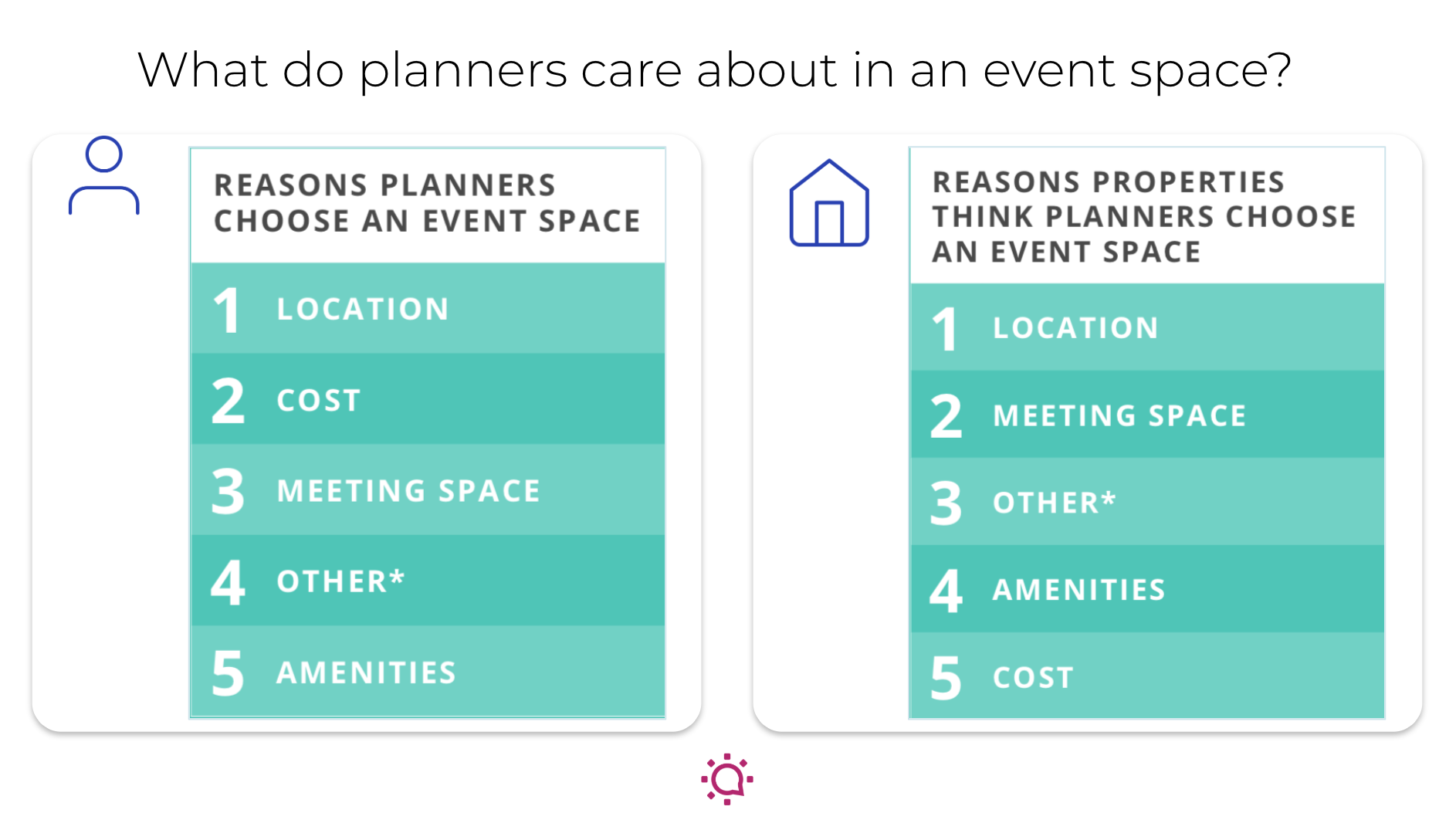
This type of misalignment creates a fundamental disconnect and keeps venues from being able to speak the right “language” in negotiations and pitches.
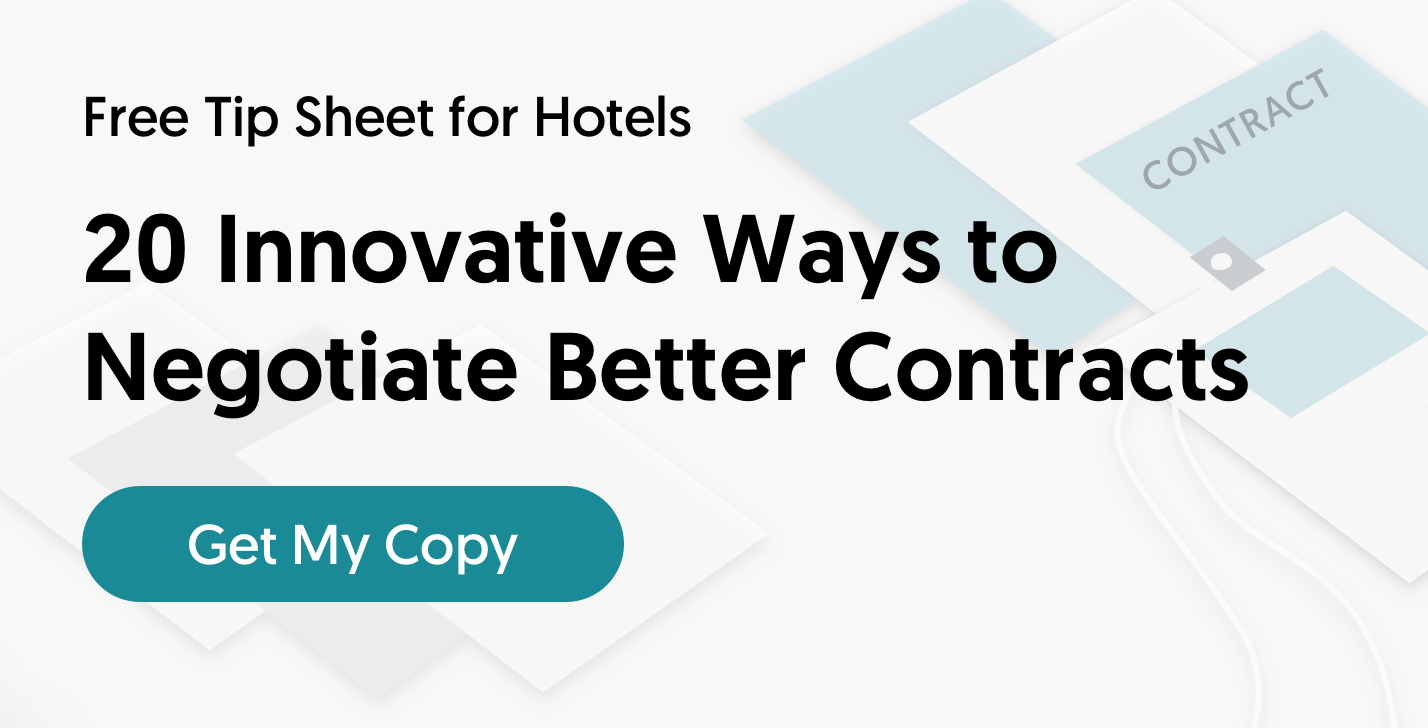
3. Communicate visually.
When planners can visualize our space, they can imagine their event in your property. This is powerful because 90% of information transmitted to the brain is visual, and visuals increase retention by 4x.
It boils down to presenting a bulleted list or a diagram of the event. Which would help you visualize an event better?
Using event diagramming software, properties can easily create templates and then create custom diagrams for proposals. Plus, properties can easily pull diagrams from similar events and make a few quick tweaks, saving time and boosting close rates. Planners can even hop in and work with properties in real-time.
4. Customize the site visit.
In the same survey, Social Tables found that close rates jump 10% when venues offered a customized site inspection.
But what are planners actually looking for in a site visit? The image below breaks down the survey results. As you can see, it’s all about aesthetics.
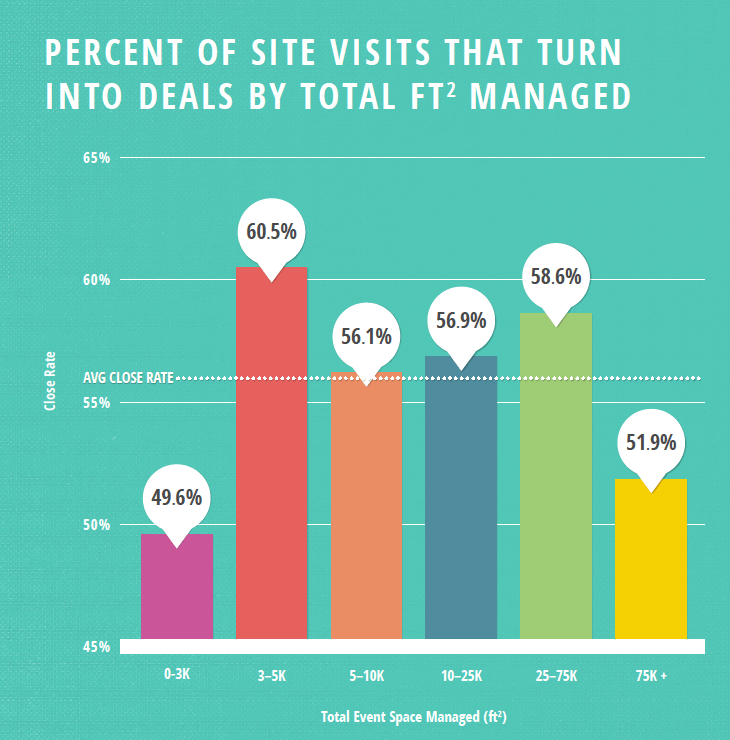
To customize the site inspection, set the room and tailor the walk-through to the event. Here are some other ideas:
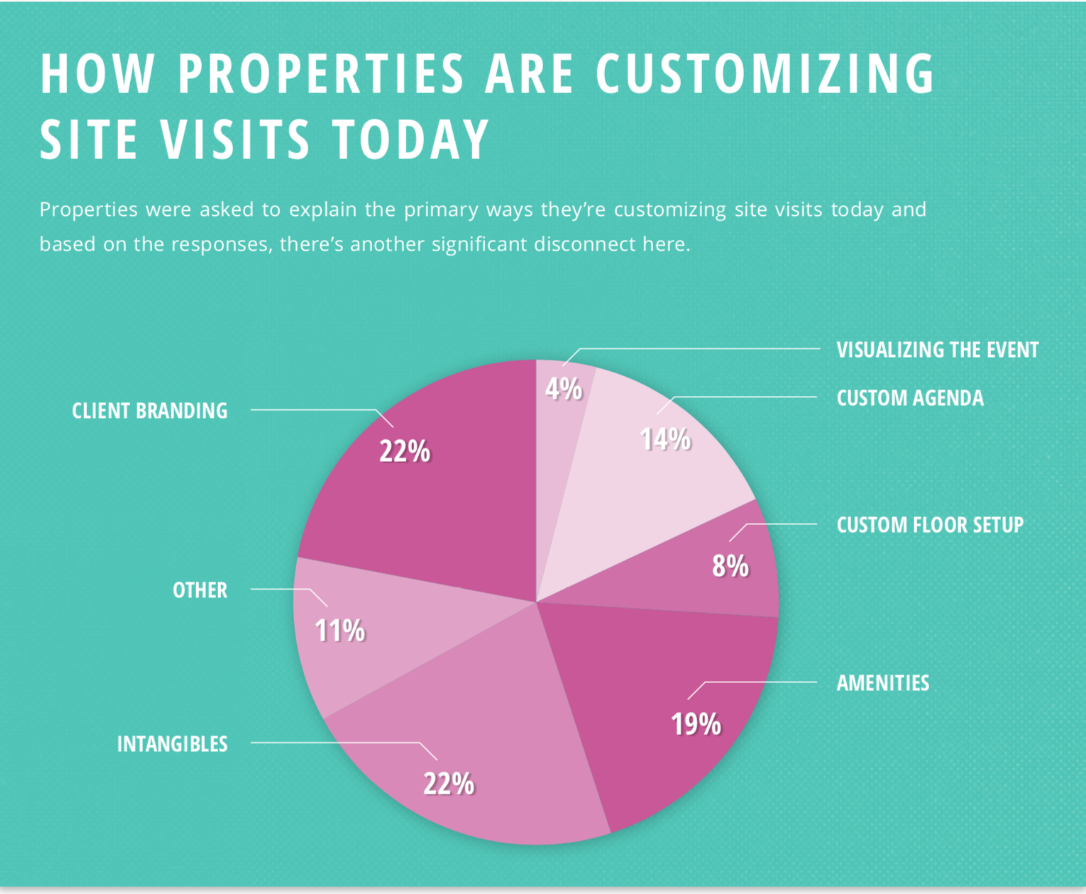
Finally, make sure you have a decision-maker on-site. Because if a planner walks out without signing, there’s a 50% chance they’re not coming back.
5. Give planners a single point of contact.
When surveyed, a majority of planners said that bad communication was the number one reason that they ultimately went with another venue. A single point of contact can eliminate bad communication and win more group business.
When planners are sent from one rep to the next, communication becomes a burden. In fact, getting passed along from one venue rep to the next is one of the biggest pet peeves of planners.
Give planners a single, main contact and have that contact source details from other reps and departments.
6. Centralize communication.
In addition to giving planners a single point of contact, you can centralize communication using an event management tool. This way, you can get rid of email chains. The right tool can keep all conversations and files in one place. This makes communication even easier and your relationships will definitely improve.
It can make a huge difference throughout the contract negotiation and planning process. The venue contract, diagrams, and approvals are stored together in place for all stakeholders.
7. Include internet on the house.
Power, rigging, and internet costs can kill a planner’s event budget. Most events need some kind of internet, and you’re probably already prepared to do it in house. So why not include internet as a bonus?
Everybody wins, and the inclusion can lead to more flexibility in a different part of the negotiation.
8. Prove the success of past, similar events.
Here’s one way to convince planners to consider your space: Prove that the space has worked for a similar event in the past. Share diagrams, floor plans, results from post-event surveys, and feedback from other planners.
Using a cloud-based tool for floor plans, diagramming, and guest management makes it easy to pull the past examples that kickstart future relationships ” especially if it has smart online file storage for events.
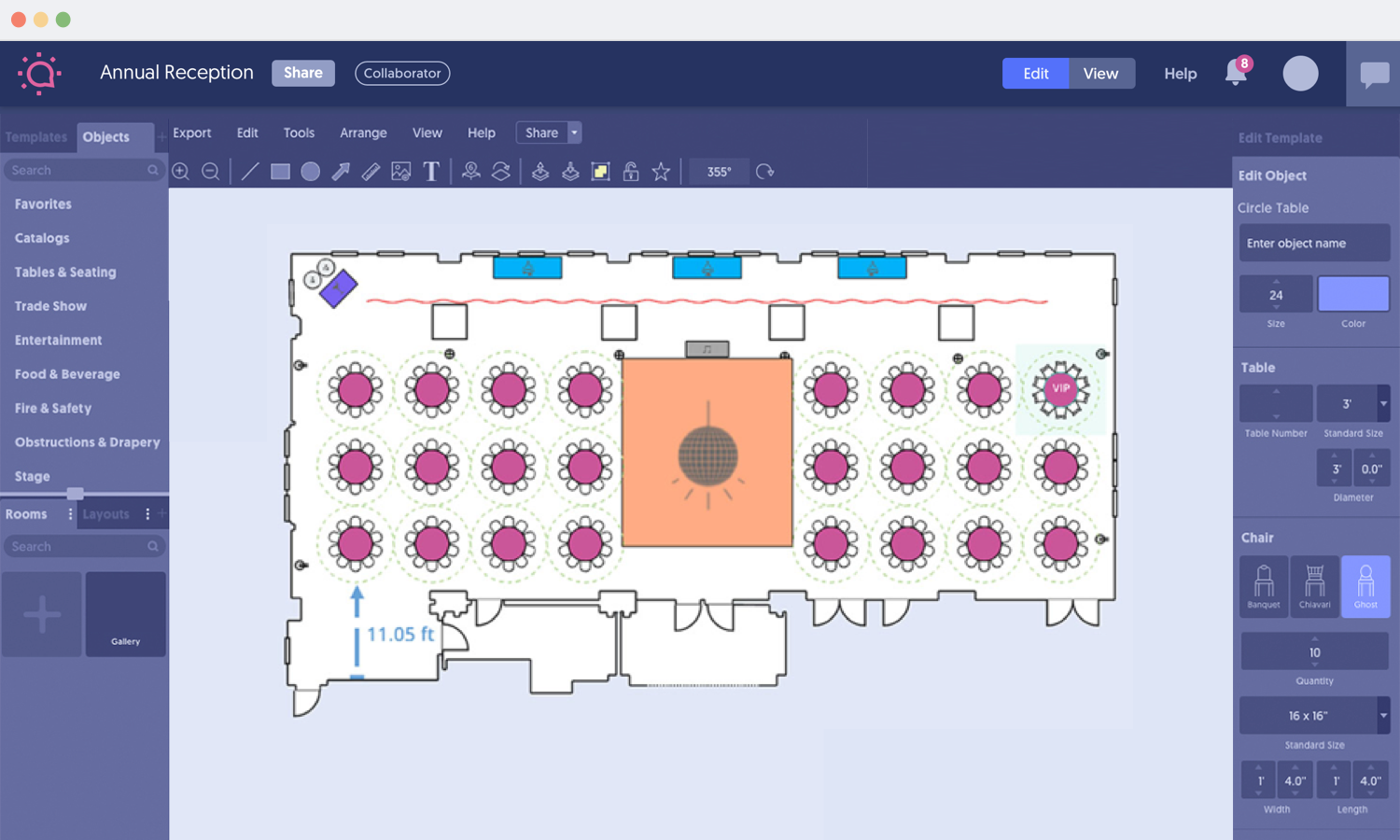
9. Apply attrition fees based on hotel demand.
If unused rooms from a block are sold, proactively offer lower attrition rates. Planners might negotiate this anyway, but offering it proactively can really build a relationship.
At the end of the day, your property is going to make the money either way. So why not use that to start out on the right foot?
If a room block is being held for a high-demand period, offer to minimize attrition fees in exchange for releasing rooms earlier. This gives you more opportunity to fill those rooms with higher-rate transient business, while also incentivizing the planner and building the relationship.
10. Don’t be afraid to connect planners with local suppliers.
Today’s leisure and business travelers crave authenticity, no matter the destination. Hotel rooms and meeting spaces don’t usually reflect the destination. As a result, planners often lean toward local hotspots like restaurants and museums.
That leaves hoteliers with two options:
- After planners book another event space, let them decide if they want to book a room block at a hotel ” or chance it with Airbnb.
- Proactively reach out to local venues and set up a preferred pricing referral agreement. That way, you can satisfy planners who want something different and still fill your rooms.
With these types of partnerships, you have a card to play when planners tell you they want to expand beyond the usual experience.

With partnership and purpose, comes event success.
Both planners and properties ensure an event’s success. By collaborating and being transparent about needs and wants, both parties can meet their goals. Negotiating hotel contracts for events can lead to stress and strife, but only because of miscommunication and misalignment.
Start with the event purpose, and keep that as the main focus through the proposal, contract process, and beyond.
Want to save these tips for later? Download our free Guide to Event Contracts!
Have more questions about hotel contracts?
Typically, the most important clauses in hotel contracts involve who is bearing the risk and liability for an event. Force majeure and cancellation clauses are also critical.
Updated December 7, 2018

